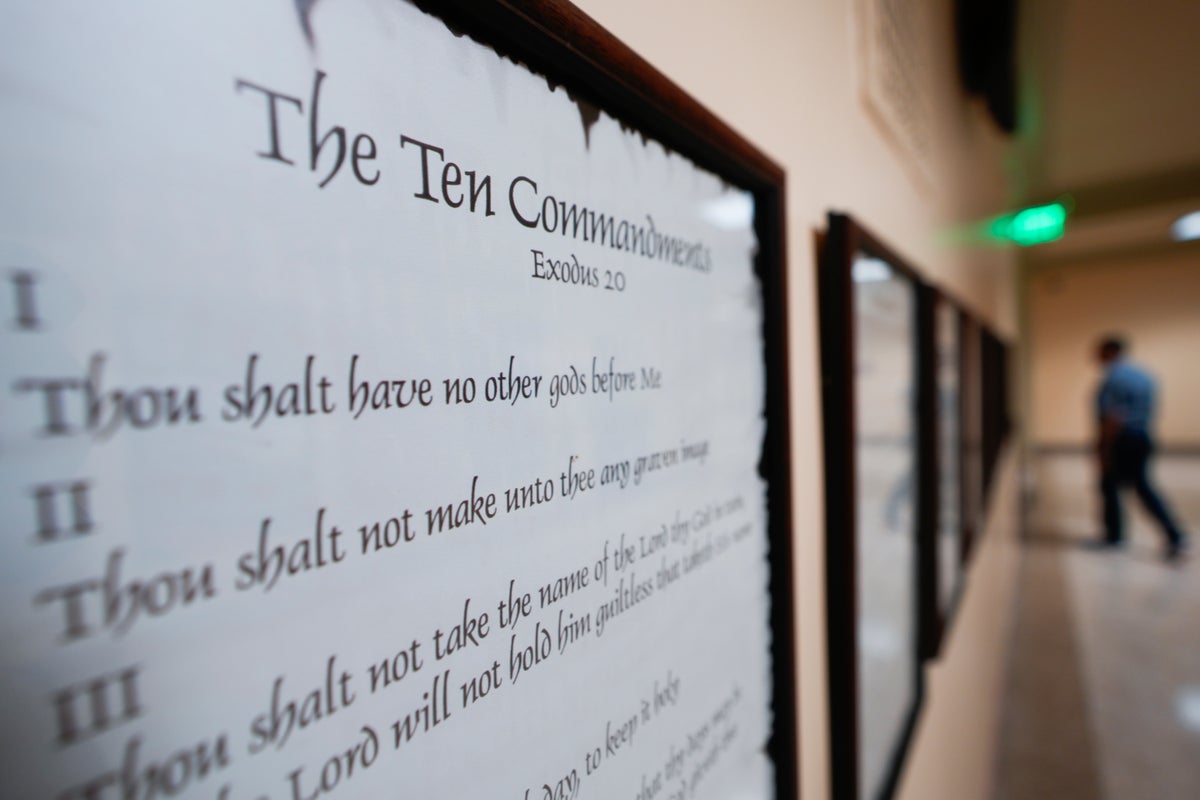Louisiana’s law requiring a copy of the Ten Commandment in every public school classroom poses an unconstitutional threat to the First Amendment, according to a ruling from a conservative federal appeals court.
Friday’s decision from a three-judge panel at the 5th Circuit Court of Appeals in New Orleans could tee up yet another major Supreme Court battle over the First Amendment’s firewall between church and state in America’s schools.
The ruling upholds a lower court’s ruling that feared a “real and substantial likelihood of coercion” if Louisiana students are forced to be a “captive audience” for “a specific version of the Ten Commandments, one posted in every single classroom.”
The law, signed by Governor Jeff Landry last year, was the first of its kind in the United States. Texas lawmakers approved similar legislation last month requiring all public school classrooms to prominently display a large poster of the Ten Commandments.
“We are grateful for this decision, which honors the religious diversity and religious-freedom rights of public school families across Louisiana,” said the Rev. Darcy Roake, a lead plaintiff in the case along with her husband, Adrian Van Young.

Roake, a Unitarian Universalist minister with a child in New Orleans public schools, sued the state shortly after Landry signed the bill into law last year.
“As an interfaith family, we believe that our children should receive their religious education at home and within our faith communities, not from government officials,” she added.
Louisiana Attorney General Liz Murrill and the administration “strongly disagree” with the ruling and plan to appeal, she said in a statement.
“We will immediately seek relief from the full Fifth Circuit and, if necessary, the U.S. Supreme Court,” she said.
Rachel Laser, president of advocacy group Americans United for Separation of Church and State, said, “This ruling will ensure that Louisiana families — not politicians or public-school officials — get to decide if, when and how their children engage with religion.
“It should send a strong message to Christian Nationalists across the country that they cannot impose their beliefs on our nation’s public-school children,” she added. “Not on our watch.”

Landry signed the legislation from a Catholic school auditorium after announcing that he “can’t wait to be sued” by turning Louisiana into the first state to mandate the Ten Commandments in schools.
The law required all schools to display the text exactly as written in the bill, and in “a poster or framed document that is at least eleven inches by fourteen inches” — at minimum — and “in a large, easily readable font.”
It also requires a 200-word “context statement” arguing that the Ten Commandments were “a prominent part of American public education for almost three centuries” up to 50 years ago.
The legislation and legal battle surrounding the measure are among several cases putting students and teachers at the center of conservative Christian movement using the courts to test the limits of the First Amendment’s establishment clause, which prohibits both religion in government as well as political control of religion by the government.
Last month, Texas lawmakers approved a bill requiring public elementary or secondary schools to “display in a conspicuous place in each classroom of the school a durable poster or framed copy of the Ten Commandments.”
Lawmakers in Arkansas have advanced similar legislation, and Oklahoma’s chief school officials mandated copies of the Bible and Ten Commandments in all classrooms with “immediate and strict compliance.”
In 2005, the Supreme Court ruled that the public display of the Ten Commandments in two Kentucky county courthouses was similarly unconstitutional.
But a Supreme Court ruling in 2022 loosened interpretations of the First Amendment’s so-called establishment clause to allow a high school football coach to pray with his team on the 50-yard line.
In her dissent in that case, Justice Sonia Sotomayor warned that the Supreme Court “continues to dismantle the wall of separation between church and state that the Framers fought to build.”
Last month, in a surprise 4-4 vote, the Supreme Court’s lack of a decision in a major Oklahoma case derailed the state’s plans to create the first-ever taxpayer-funded religious public charter school.
That lack of a decision allowed lower-court rulings to stand, preventing the state from opening the St. Isidore of Seville Catholic Virtual School in violation of the Constitution and state law.



